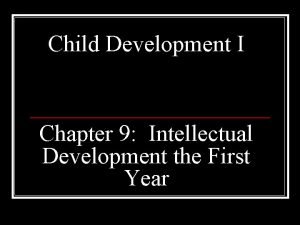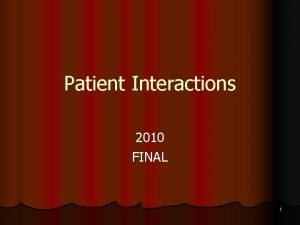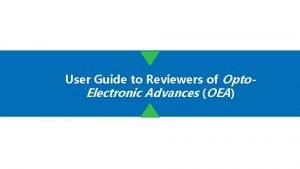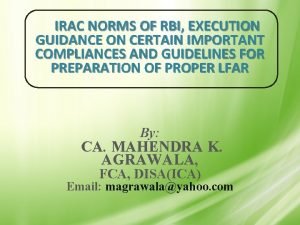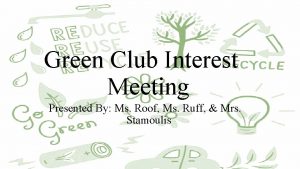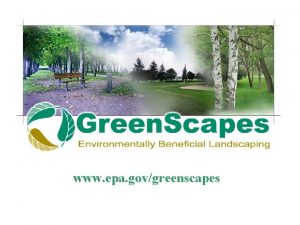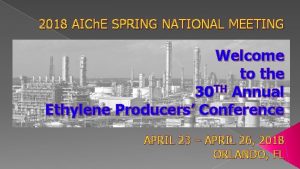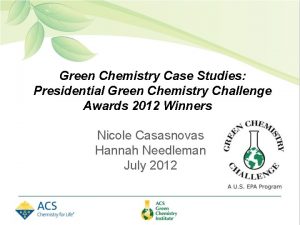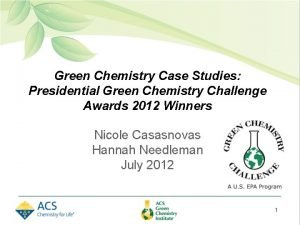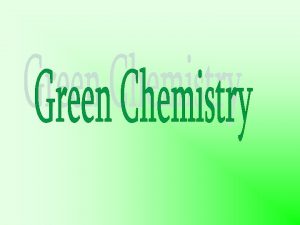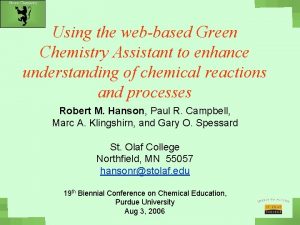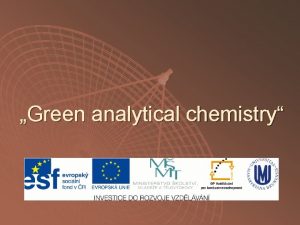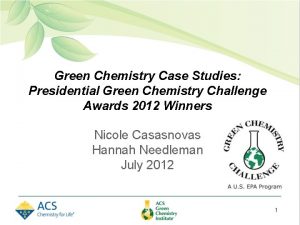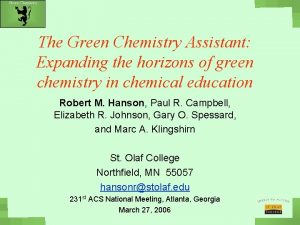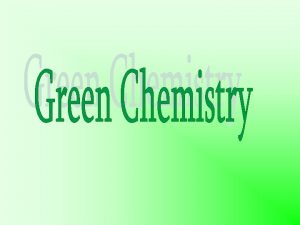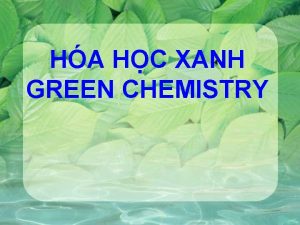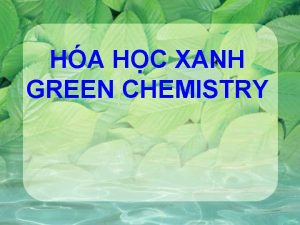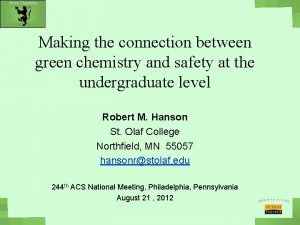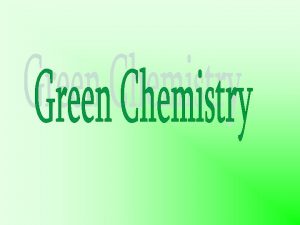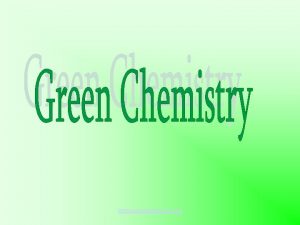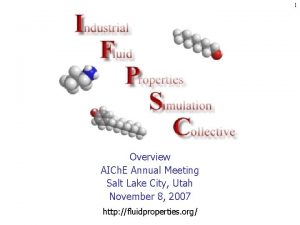EPA Green Chemistry Advances AICh E National Meeting

















- Slides: 17

EPA Green Chemistry Advances AICh. E National Meeting San Francisco, CA John Leazer, Ph. D 05. November. 2013

Sustainable development is an evolving process that improves the economy, the environment, and society for the benefit of current and future generations - President’s Council on Sustainable Development 1998

What is Green Chemistry? • Use of latest technologies? • Good development chemistry?

Green Chemistry Definition Green Chemistry is the utilization of a set of principles that reduces or eliminates the use or generation of hazardous substances in the design, manufacture and application of chemical products.

Green Chemistry and Engineering The adoption of the green chemistry and engineering requires a paradigm shift to occur. Decaffeination via CH 2 Cl 2 Decaffeination via CO 2 Coffee Beans with no caffeine

TEST Toxicity Estimation Software Tool • • • PROBLEM: There is a need to provide a reasonable estimate for toxicity values for a wide range of toxicological endpoints used for risk management tools TECHNOLOGY SOLUTION: – Toxicity can be estimated using Quantitative Structure Activity Relationship (QSAR) models – Developed a novel estimation technique based on hierarchical clustering methods – A user friendly software tool was developed to allow users to easily estimate the toxicity using QSAR models CURRENT STATUS: Version 3. 2 of the software is available for download on the EPA website – TEST allows users to rapidly estimate acute aquatic toxicity, acute mammalian toxicity, and mutagenicity – TEST is being used by users all over the world 5 http: //www. epa. gov/nrmrl/std/cppb/qsar/index. html

GREENSCOPE - Sustainability Evaluator • Taxonomy, definition, and data needs of indicators for the sustainability assessment in chemical processes according to the environmental, efficiency, energy, and economic bases proposed by the GREENSCOPE* methodology • Create a sustainability performance assessment tool that can support a decision-maker to determine whether a process is becoming more or less sustainable • Monitoring and prediction of the process sustainability at any stage of process design • Gate-to-gate evaluation * Gauging Reaction Effectiveness for the Environmental Sustainability of Chemistries with a multi-Objective Process Evaluator

WAR (WAste Reduction Algorithm) • • • PROBLEM: There is a need to be able to identify and evaluate environmental concerns of chemical manufacturing processes. There is also a need to educate professionals so that they will consider environmental issues when evaluating the performance of these processes. TECHNOLOGY SOLUTION: – The WAR GUI software allows users to enter chemical process data and then estimate the potential environmental impact – The software allows the users to compare several different process designs using several different environmental impact categories CURRENT STATUS: Version 1. 0. 17 of the software is available for download on the EPA website – WAR is being used as an educational tool worldwide (researchers from 50 different countries have downloaded it) 7 http: //www. epa. gov/nrmrl/std/cppb/war/sim_war. htm

PARIS II Program to Assist the Replacement of Industrial Solvents • PROBLEM: Solvents used by industry are often hazardous and can cause significant environmental impact. • TECHNOLOGY SOLUTION: –EPA’s PARIS II software finds less harmful solvents or solvent mixtures to replace the more hazardous solvents. –The replacement solvents or solvent mixtures have similar physical and chemical properties as the original solvents. –The replacement solvents or solvent mixtures are less hazardous. • CURRENT STATUS: The PARIS II software is available for internal EPA use. 8

Green Chemistry Catalytic Ozone Technology • • • 9 Problem: Large amount of volatile organic (methanol) and sulfur compounds are released to the environment every year – Current technologies such as Incineration, thermal combustion are energy intensive, not economical, and generate NOx, SOx Solution – Technology highly effective at industrial scale tests – Methanol converted to methyl formate (less 250 o. C) – Complete removal of sulfur containing air pollutants Status: Collaboration with at Domtar Pulp Mill, Hawesville, KY for further tests

Green Chemistry Membrane Assisted Vapor Stripping for Efficient Biofuel Production • PROBLEM: Conventional separation of dilute alcohol-water mixtures in biofuel production is energy inefficient • TECHNOLOGY SOLUTION: –hybrid process integrating vapor stripping, vapor compression, and vapor permeation membrane operations • enables the efficient recovery of process heat –>50% energy savings experimentally verified • CURRENT STATUS: –developed in collaboration with US membrane company • US and International patents pending • end-user tests in progress 10 –exploring process enhancements and application to other energyintensive separation challenges

Nanotechnology • • • 11 PROBLEM: As materials, composites and products based on nanotechnology are developed and enter the marketplace, there exists a need to evaluate their potential environmental impact across the entire life cycle. TECHNOLOGY SOLUTION: –Applying a holistic approach towards the design, manufacture, use and disposal of these materials. –Development of new methodologies for these materials and performing Life Cycle Inventories Assessments (Ag, Li and CNTs). –Utilizing Green Chemistry to design environmentally friendly nanomaterials –Understanding the link between the physical properties of nanomaterials and their interaction with the environment. CURRENT STATUS: Continued in-house directed research in the area of method development, synthesis, physical characterization and application of nanomaterials. Also, beginning to have increased industrial participation.

Green Synthesis of Nanomaterials PROBLEM: Green’ synthesis of nanoparticles using biorenewable sources. TECHNOLOGY SOLUTION: Utilize source of polyphenols from agricultural waste. CURRENT STATUS: ‘Rags to riches’ story of nanoparticle generation using red wine and red grape pomace. 12 Baruwati, Varma, Chem. Sus. Chem, 2, 1041 (2009)

Green Remediation PROBLEM: There are ~ 500, 000 contaminated sites across the USA. Current cleanup technology requires excavation and may even generate toxic by-products. Remediating various environmental toxins in the subsurface and in water at or around these sites is a complex challenge. TECHNOLOGY SOLUTION: Through a CRADA (445 -08) between EPA’s National Risk Management Research Laboratory (NRMRL) and the private company Veru. TEK in Bloomfield, Connecticut, EPA green-synthesis technology is being used to further improve Veru. TEK’s green remediation and treatment technologies used in environmental cleanup. This project combines EPA’s expertise in green synthesis of nanoparticles with Veru. TEK’s expertise with surfactant enhanced in situ chemical oxidation and reduction methods. The benefits from the new greensynthesis methods over conventionally used processes are: only natural materials are used; no hazardous waste is produced; reduced processing is required; materials are more stable, easily stored, and transported; and, materials can be more easily produced around the world. Current Status: Demonstrated destruction of contaminated soils A regular and a provisional U. S. Patent filed in 2008 and 2009. 13 Nadagouda, Hoag, Collins & Varma: Crystal Growth & Design, 9, 4979 (2009); Remediation Application: J. Mater. Chem. 19, 8671 (2009); Toxicity studies: Green Chemistry, 12, 114 (2010)-Hot Article

Development of a Technology - Sorbster® • Jointly developed, protected technology under CRADA (#192 A-00) • Intellectual property portfolio; EPA is an assignee • • US 7, 341, 667 (Mar. 2008), US 7, 449, 118 (Nov. 2008), US 7, 479, 230 (Jan. 2009). Provisional patent filed April 2009 International Patents (applied); China, India, Canada and Japan EPA has issued an exclusive worldwide license to MAR Systems Target Market - Drinking Water – US Market – 13 Million people – Global Market – 100 Million people Other Markets: – Industrial Water Discharge Treatment – Mining Runoff – Coal and Incinerator Stack Gas (incl. mercury) – Industrial Ecology Market Penetration – Strategic Partnerships – Low cost, ‘Home Depot’ Solution MAR Systems Named by Business Week as One of 'America's Most Promising Start-ups’; January 2011. 14

Green Chemistry Is About Innovation, Understanding Impacts &. . . . Waste Materials Hazard Risk Energy Environmental Impact COST

Innovating on Innovation…… Thank You
 Show me green
Show me green Axis powers
Axis powers Tally solutions pvt ltd
Tally solutions pvt ltd Advances in technology during wwii
Advances in technology during wwii Chapter 9 intellectual development in the first year
Chapter 9 intellectual development in the first year Advances in real time rendering
Advances in real time rendering Advances in mri
Advances in mri Short term loans and advances
Short term loans and advances Opto-electronic advances
Opto-electronic advances Recent advances in ceramics
Recent advances in ceramics Asset classification norms
Asset classification norms Global oncology trends 2017 advances complexity and cost
Global oncology trends 2017 advances complexity and cost Advances in memory technology
Advances in memory technology Today meeting or today's meeting
Today meeting or today's meeting Meeting objective
Meeting objective What is meeting and types of meeting
What is meeting and types of meeting Types of meeting
Types of meeting In the green club meeting
In the green club meeting




